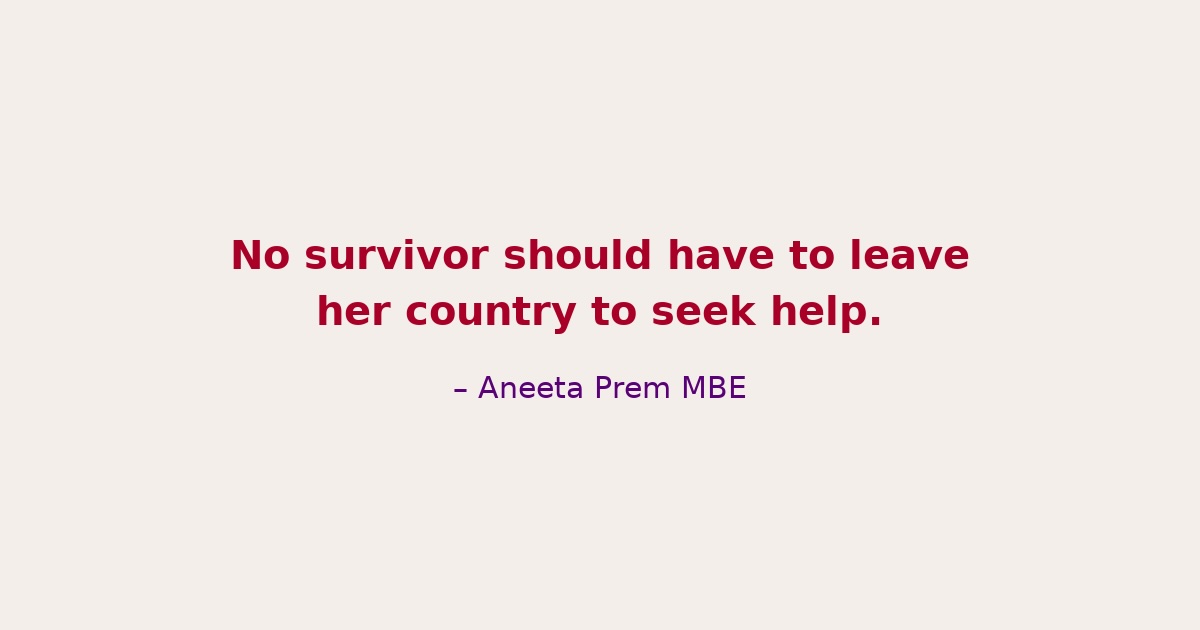
Recent coverage has highlighted that women in the UK are travelling abroad for FGM reconstruction surgery. Their journeys are expensive, complex and emotionally demanding. The Sky News report by Ashish Joshi has helped bring this reality into public view:
https://news.sky.com/story/why-women-are-being-forced-to-go-abroad-to-help-heal-from-a-lifetime-of-trauma-13471703
Behind every headline is a survivor who lives with the long-term impact of FGM and who often feels unsure where to turn for help. Globally, the World Health Organization estimates that more than 230 million girls and women have undergone FGM. In England and Wales, research suggests that around 137,000 women and girls are living with its consequences. Many of them are here in the UK, trying to rebuild their lives.
As someone who has worked with survivors for many years, I see how deeply FGM affects health, relationships and everyday life.
“FGM causes lasting harm. Survivors deserve clear information, safe choices and access to care that respects their dignity.”
At the moment, reconstruction surgery is not offered as a routine NHS treatment. National clinical bodies say the evidence base is still developing. Studies from European centres show promising results for some women, but many involve small groups and short follow-up. Because of this, the Royal College of Obstetricians and Gynaecologists has advised caution and the NHS has focused on deinfibulation, maternity care, safeguarding and psychosexual support.
Offering reconstruction safely would also require trained surgical teams, theatre time and specialist psychological support. Until those structures are in place, survivors who wish to explore reconstruction find that there is no NHS pathway.
Some European clinics, including those in Switzerland, work within a different framework. Geneva University Hospitals, for example, offers FGM care and clitoral reconstruction within its specialist service. In Switzerland, compulsory health insurance can cover treatment for residents. For UK survivors, however, treatment abroad usually means paying privately for surgery, travel and recovery.
“When a survivor feels she has no option but to leave the UK and raise money for surgery overseas, it exposes an inequality we cannot ignore.”
Travelling abroad for medical treatment is not an easy choice. Women must navigate an unfamiliar system, manage language and cultural differences, and cope with the emotional weight of revisiting trauma. Many also carry anxiety about what will happen if complications arise once they are back in the UK.
At the same time, survivors describe powerful reasons for seeking reconstruction. Some hope to reduce pain. Others want to improve intimacy or regain a sense of wholeness after childhood abuse. Their decisions are personal and complex.
Survivors need balanced information about what reconstruction can and cannot do. They should be able to weigh potential benefits and risks, and to make decisions free from pressure. Research is continuing in Europe and in the UK, and survivor voices must sit alongside clinical evidence when the next phase of guidance is written.
“Every survivor has the right to understand all the safe options available to her. Healing should be based on informed choice, not on guesswork or fear.”
My detailed article for Freedom Charity sets out the wider picture, including data, clinical guidance and the changes needed to make support fairer for survivors in the UK:
https://freedomcharity.org.uk/fgm-reconstruction-surgery-uk/
Freedom Charity works with schools, communities and professionals to prevent FGM and support those already affected. Prevention is essential. Supporting survivors across their whole lives is just as important.
“FGM is a violation. Recovery is a journey. No survivor should have to walk that journey alone or feel forced to leave her own country to seek help.”

The books I wrote, how they are used in schools, and the safeguarding outcomes recorded

Taliban criminal code domestic violence; Afghanistan domestic violence law; domestic abuse impunity Afghanistan; Taliban justice system women

For some young people, even a Valentine’s card can trigger control, punishment and fear. Dishonour-based abuse often begins long before a wedding.
.jpg)
Rare Disease Day 2026 falls on 28 February. This is what the zebra stripes symbolise, and why equity for rare conditions must be measured in real systems, not slogans.

Kajal Saini and Mohammad Arman were found dead in Uttar Pradesh, and the language used to describe their murder matters.